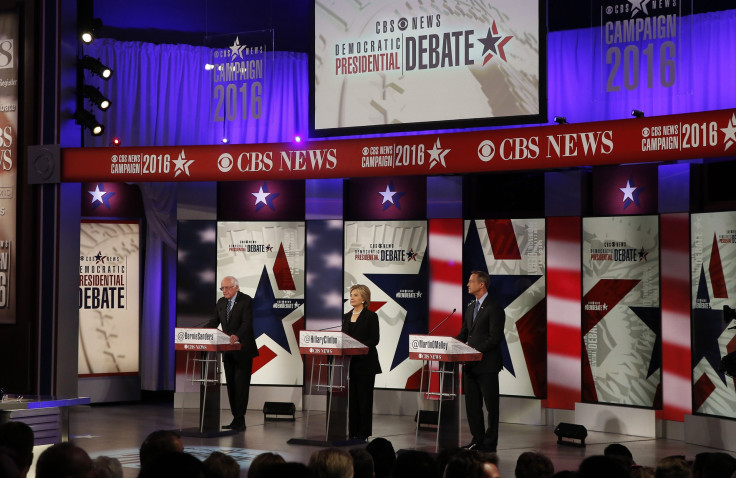Who Won The Democratic Debate? No Clear Victor Means Hillary Clinton Could Keep Dominating

Saturday night's Democratic debate ended -- eight minutes early -- with no clear winner among Vermont Sen. Bernie Sanders, former Secretary of State Hillary Clinton and former Maryland Gov. Martin O'Malley. They all did well, but nobody stood out, and because of this, Clinton emerged victorious.
Sanders came off stronger than usual against the party's front-runner, calling her out on campaign contributions from Wall Street donors, tepid support for raising the minimum wage and her 2003 vote backing the invasion of Iraq. More than 600 people had named Sanders the debate winner in a C-SPAN Facebook poll shortly after 11 p.m. Saturday compared with 200 for Clinton.
Sanders performed well on economic issues but appeared to falter on foreign policy, an especially important issue the day after a series of Islamic State group attacks in Paris killed about 130 people and injured more than 300 others. Clinton "showed her chops," Time reported. O'Malley alleged that Libya, Syria and Iraq were "a mess" despite her time as secretary of state, but Bloomberg said she "seized the moment to make the case that she's the best qualified to succeed her old boss," President Barack Obama. Clinton said she had detailed plans on what the U.S. and its allies could do to coordinate against terrorists.
O'Malley also achieved brief notoriety when he once again insulted GOP front-runner Donald Trump by calling him a "carnival barker" for his drastic immigration proposals, but mostly faded into the background. He wasn't able to pull off the necessary leap-frog into relevancy. "Martin O’Malley’s biggest problem is that he remains the third wheel in a two person race," PoliticusUSA wrote.
Twitter was similarly divided over who emerged victorious Saturday night:
O'Malley was very impressive tonight. Possible 'winner' (in terms of possible new supporters).
— Trae Camp (@TCamp3) November 15, 2015I think the winner of the Democratic debate is @HillaryClinton. She got hammered by questions about her emails & Benghazi came through.
— Jason (@chosenhorse2) November 15, 2015Not sure how to score a debate but I feel like @BernieSanders was the clear winner tonight. #DemDebate
— Jason Jones (@jjones670) November 15, 2015Biggest winner of the night was CBS. That was a well run debate. #DemDebate
— Brazil (@Brazil201) November 15, 2015Hillary got Bin Laden, O'Malley got... #DemDebate pic.twitter.com/S6dvPxcnlz
— Ann Telnaes (@AnnTelnaes) November 15, 2015Was there a winner in tonight's debate? I didn't feel like any candidate really helped/harmed themselves.
— LifeBetweenTheEyes (@LifeBtwnTheEyes) November 15, 2015Clinton has maintained a healthy lead over both men. The HuffPost Pollster, which aggregates national data, found Friday that 56.1 percent of likely Democratic primary voters backed Clinton. Only 31.7 percent and 2.6 percent supported Sanders and O'Malley, respectively.
The Washington Post reported Friday that Clinton had "neutralized the Bernie Sanders threat," judging from poll numbers that put her ahead of him on the economy and regulating large banks. But voters held out when asked about authenticity. About 62 percent of respondents to a New York Times/CBS News poll said they thought Sanders said what he believed, compared to 52 percent who said the same for Clinton.
But as for the debate itself, Clinton just needed to "not blow it," according to Slate. After her marathon testimony Oct. 22 before a committee on the 2012 Benghazi terrorist attacks, Clinton was popular, and Sanders reluctant to attack. Her strategy centered around one theme: don't ease up. “We have said from the beginning that we were going to fight like we were behind and that’s what we’ve done,” spokeswoman Christina Reynolds told the Atlanta Journal-Constitution earlier this week. “We know things can change quickly.”
© Copyright IBTimes 2025. All rights reserved.






















